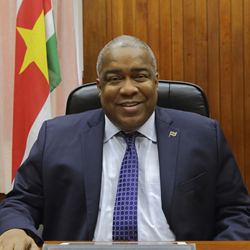
GlobalMarkets: How has Suriname recovered from the commodity shock? Gillmore Hoefdraad, Minister of Finance, Suriname: The disappearance of the century-old alumina complex and the drop in oil and gold prices triggered major triple shock in 2014-16. But in place of alumina we have a brand new gold mine [Merian] that nearly doubles exports, and a new oil refinery that almost eliminates net oil imports. That, together with a recovering private sector and the end of fiscal retrenchment, has allowed the return to growth. GDP grew 1.7% last year and there are no signs that the economy will be reverting to a recession. There is a good pipeline of investment in gold, oil and other areas, which bodes well for the future.
GlobalMarkets: What are the policy challenges and priorities now to ensure a sustainable recovery?
Hoefdraad: Firstly, we must ensure that the balance of payments and monetary situation remain sustainable. The current account deficit in the balance of payments shrunk to nearly zero but will now grow slightly as imports grow. Nonetheless, reserves are growing and clearly exceed the minimum three months of imports. Secondly, we need to retain fiscal expenditure restraint and increase revenue.
Economic reforms are now required to allow the government to move with agility and mitigate future commodity shocks. The sovereign wealth fund will begin operations on January 1, 2019. We must also put in place legal and administrative reforms to make fiscal management more agile and improve the investment climate. Internal reform is needed in the ministry of finance to bring our administration firmly into the first 21st century, with more automation, computerisation and a flexible human capital base to allow us to address problems when they arise.
GlobalMarkets: How do you plan to meet your fiscal targets?
Hoefdraad: Our objective is to continue to shrink the fiscal deficit, which was quite unsustainable in 2015/16. In 2017 we saw the first benefit of reforms and a continued expenditure restraint. Now we are expecting revenue to pick up back to historical norms. With VAT postponed, in the interim we are putting in place other taxes, such as a temporary increase in import taxation and an increase in road and vehicle taxes. The idea is to ease the fiscal burden away from expenditure compression to greater revenue.
GlobalMarkets: Why did VAT not go ahead as planned?
Hoefdraad: VAT is a complex creature. The world experts at Cartac (Caribbean Regional Technical Assistance Centre) in Barbados told us repeatedly that you have to make sure you implement VAT correctly; you cannot repair it afterwards. This needs a very well written law, regulations that fit, human capital and training in the ministry of finance to manage it, and to educate people and companies. We do not yet have all those conditions in place, so were risking doing it wrong if we did it in 2018. The timetable at the moment suggests it will be implemented in 2020.
GlobalMarkets: What has the government done with the funds from Staatsolie?
Hoefdraad: The funds from Staatsolie are being used for debt refinancing and reducing the country’s interest burden. The government has deposited the funds in the central bank, is selling the hard currency to increase reserves, and is using local currency proceeds to retire treasury bills as they mature. This has the double benefit of increasing reserves and reducing the cost of debt. It is an ongoing process and funds that are deposited will be used in the coming months to retire bills. Moreover, buying back the treasury bills injects liquidity into the market, bringing a reduction of interest rates. There has already been a consequent pick-up in credit to the private sector.
GlobalMarkets: What effect might a significant offshore oil discovery have on Suriname’s economic outlook?
Hoefdraad: To say that a significant oil discovery would be a game-changer for Suriname would be the understatement of the century. The finds in Guyana are worth a multiple of GDP and in Suriname it could be similar. Suriname is very well positioned to benefit directly from an offshore find because we have existing oil infrastructure and a very large construction industry surrounding the mining industry.
GlobalMarkets: How can Suriname diversify its economy beyond the extractive industries?
Hoefdraad: Suriname wants to diversify away from its heavy reliance on the extractive industries, and the areas most ripe for growth are agriculture and tourism. Diversifying is not easy but there has been quite a bit of recent interest in other industries, for example the establishment of an industrial park near the harbour where the bauxite refinery was. Alcoa is driving this and there is important interest from outside investors to build on this.
GlobalMarkets: What message would you send to companies considering investing in Suriname?
Hoefdraad: Suriname has vast amounts of land and fresh water resources and is more than 90% covered by pristine Amazonian jungle, which lends itself to extractive industries, agriculture and tourism. Moreover, Suriname is a peaceful country with great ethnic diversity and a well educated, motivated middle class. The literacy rate is high and nearly everybody speaks at least two languages, so we have a very large pool of workers readily available to be hired by companies investing in Suriname is open for business.
